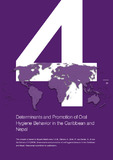Please use this identifier to cite or link to this item:
https://hdl.handle.net/20.500.14356/441Full metadata record
| DC Field | Value | Language |
|---|---|---|
| dc.date.accessioned | 2013-01-07T20:31:02Z | |
| dc.date.accessioned | 2022-11-08T10:15:01Z | - |
| dc.date.available | 2013-01-07T20:31:02Z | |
| dc.date.available | 2022-11-08T10:15:01Z | - |
| dc.date.issued | 2004 | |
| dc.identifier.uri | http://103.69.126.140:8080/handle/20.500.14356/441 | - |
| dc.description.abstract | Objective and Design: The purpose of this study was to identify psychosocial determinants of oral hygiene behavior (OHB) based on the Theory of Planned Behavior (TPB) among dental care seekers in two culturally different regions: the Caribbean (Aruba/ Bonaire) and Nepal. Measures of oral health knowledge (OHK) and the expected social outcomes of having healthy teeth (ESO) were included too. Methods: In total 221 participants in this cross-sectional study completed a multiple culturally adapted questionnaire. Results: A regression analysis examined the main effects of the determinants as well as their interactions with region (Caribbean vs. Nepal). The interaction term contributed significantly to the amount of explained variance. In the Caribbean, OHB was determined by Attitude and Social Norms, and in Nepal by Perceived Behavior Control and ESO. Conclusion: On the basis of these findings, quite different oral health care interventions are called for in the two regions. This study illustrates how the TPB may be used as a basis to assess adequate interventions in developing and underdeveloped countries. | en_US |
| dc.language.iso | en_US | en_US |
| dc.title | Determinants and promotion of oral hygiene behavior in the caribbean and Nepal | en_US |
| dc.type | Technical Report | en_US |
| Appears in Collections: | Post Graduate Grant (PG) Reports | |
Files in This Item:
| File | Description | Size | Format | |
|---|---|---|---|---|
| 442.pdf | Full Report. Download | 615.25 kB | Adobe PDF |  View/Open |
Items in DSpace are protected by copyright, with all rights reserved, unless otherwise indicated.
